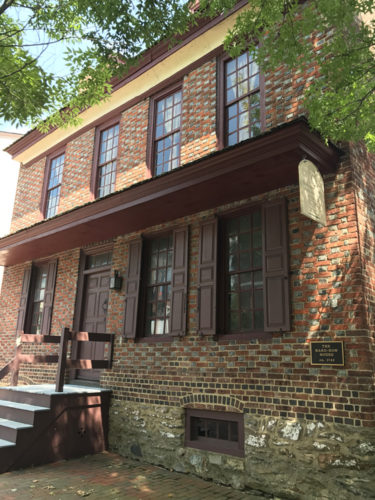“I am reserved for fortune to frown upon”
In 1736 Bennet Bard (1711–1757) of Burlington, New Jersey, was the sheriff of Hunterdon County.
Bard’s father Peter had been a Huguenot refugee arriving in America in 1706. He held important positions in the colony’s government, including colonel commandant, judge of the supreme court, and member of the governor’s council.
Two years after Peter Bard died in 1734, the council was presented with “sundry Affidavits containing Complaints of the Misbehaviour of Bennet Bard Esq Sherriff of Hunterdon as Also a Letter from some Merchants in Philadelphia to the same Purpose.”
On 23 Sept 1736 the council met to consider those complaints and the sheriff’s response. The official record says:
A few years after Bennet Bard stopped being sheriff, his son William was born. According to John McVickar’s A Domestic Narrative of the Life of Samuel Bard, M.D. (1822) and Abraham Ernest Helffenstein’s Pierre Fauconnier and His Descendants (1911), as a young man William fell in love with his cousin Mary Bard, born in 1746. But she didn’t return his affection.
William Bard reportedly moped off into the British army, enlisting in 1761. He was an ensign in the 80th Regiment when he co-signed this affidavit involving someone else’s dispute about rank.
Bard transferred into the 35th Regiment in 1765. He was still an ensign eight years later, which suggests he didn’t have the money and/or ambition to buy a higher rank.
The year after that, Ens. Bard wrote back from his station at Samford Hall in England to another cousin, Dr. Samuel Bard:
TOMORROW: This is supposed to be Bunker Hill week, right?
Bard’s father Peter had been a Huguenot refugee arriving in America in 1706. He held important positions in the colony’s government, including colonel commandant, judge of the supreme court, and member of the governor’s council.
Two years after Peter Bard died in 1734, the council was presented with “sundry Affidavits containing Complaints of the Misbehaviour of Bennet Bard Esq Sherriff of Hunterdon as Also a Letter from some Merchants in Philadelphia to the same Purpose.”
On 23 Sept 1736 the council met to consider those complaints and the sheriff’s response. The official record says:
after hearing Several Petitions and Affidavits Read against the said Sherriff: and several Affidavits on his behalf and Examining diverse Witnesses upon Oath: They are unanimously of Opinion that the said Bennet Bard has been Guilty of divers notorious Barratrys Extortions and other malversations in his Office, and of Cruelly and unjustly Useing and Abusing the Prisoners in his Custody, And that he is not fit to be Continued any longer in that officeBard remained wealthy, having inherited a mill and lots of real estate. He bought more land. He owned slaves and the labor of indentured servants. His 1743 house appears above, showing off its Flemish checker bond brickwork.
A few years after Bennet Bard stopped being sheriff, his son William was born. According to John McVickar’s A Domestic Narrative of the Life of Samuel Bard, M.D. (1822) and Abraham Ernest Helffenstein’s Pierre Fauconnier and His Descendants (1911), as a young man William fell in love with his cousin Mary Bard, born in 1746. But she didn’t return his affection.
William Bard reportedly moped off into the British army, enlisting in 1761. He was an ensign in the 80th Regiment when he co-signed this affidavit involving someone else’s dispute about rank.
Bard transferred into the 35th Regiment in 1765. He was still an ensign eight years later, which suggests he didn’t have the money and/or ambition to buy a higher rank.
The year after that, Ens. Bard wrote back from his station at Samford Hall in England to another cousin, Dr. Samuel Bard:
My Dear Sam,Four years later, Dr. Samuel Bard married their mutual cousin Mary. That can’t have made Ens. William Bard any happier.
You lay me under great obligations for the concern you express at my unhappiness; though, at the same time, it is a little ungenerous to torment me by that ironical speech, with regard to our dear cousin, telling me to live still in hopes of being happy with her.
Believe me, my dear Sam, I have long given that over. Some other person, (perhaps yourself,) is designed for that blessing, whilst I am reserved for fortune to frown upon. For my future ease, I must endeavour to forget her; how far I shall succeed in that, God only knows.
After mustering all my philosophy, I am still as discontented as ever. I am, indeed, very unhappy, and what is worse, believe I shall ever remain so.
Yours affectionately,
W. Bard.
TOMORROW: This is supposed to be Bunker Hill week, right?


No comments:
Post a Comment